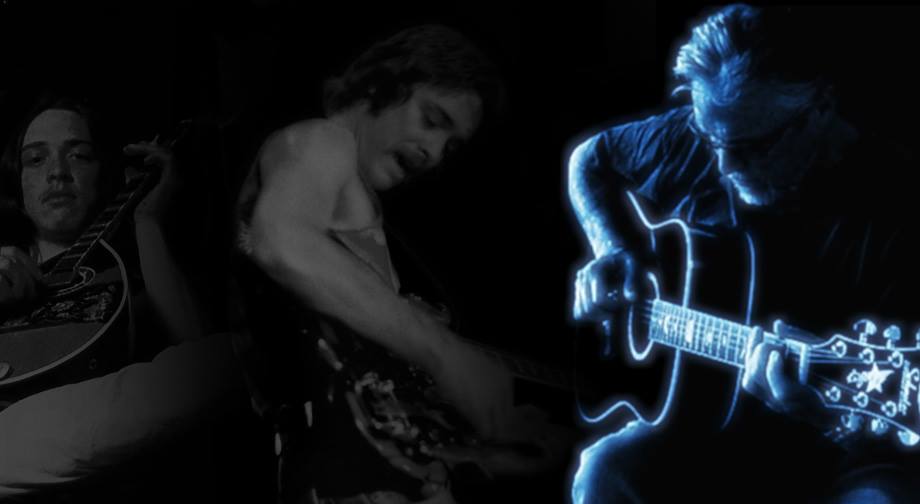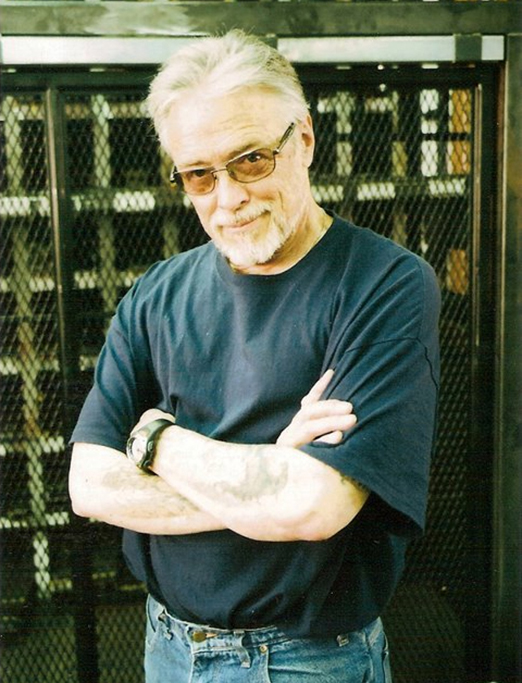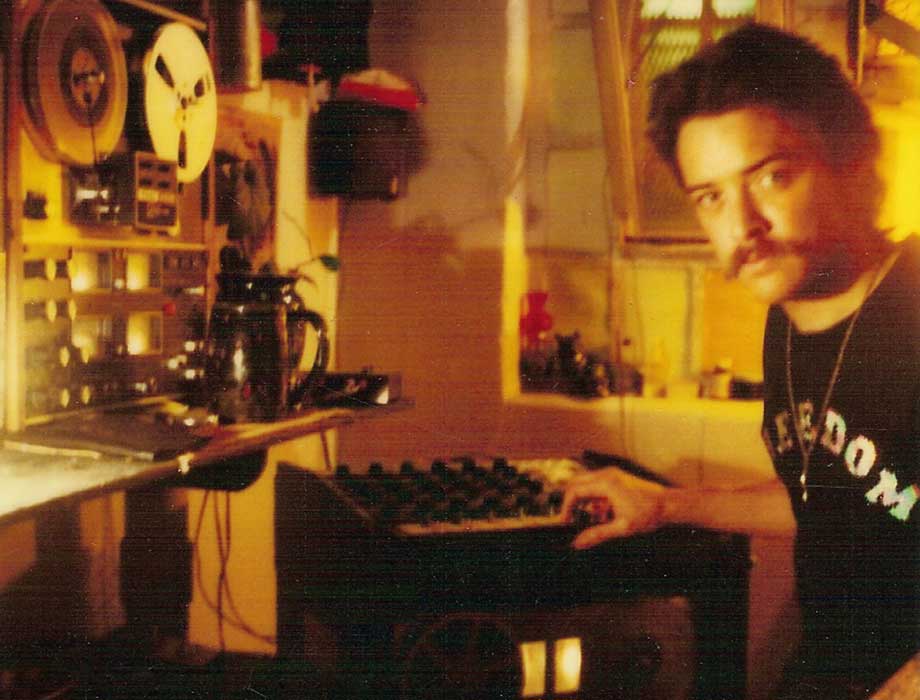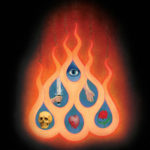Bobby BeauSoleil
2017-12-20
by Niklas Göransson
Musician, writer and visual artist; Bobby BeauSoleil is also serving a life sentence in prison. His tale is one of being condemned to die, of cultivating spirituality in nightmarish surroundings, and drawing upon the arcane to survive hell.
This is an excerpt from the full article, which is twice as long and published in Bardo Methodology #2. The issue features conversations with Bobby BeauSoleil, REBIRTH OF NEFAST, Reverend Kriss Hades (SADISTIK EXEKUTION), MANILLA ROAD, ABIGOR, ATLANTEAN KODEX, MASTER’S HAMMER, NIGHTBRINGER, RAM, IMPALED NAZARENE, CLANDESTINE BLAZE, PHURPA, and INQUISITION.

Bobby BeauSoleil presently resides within the California penitentiary system. Having initially been handed the death penalty, he’s currently sentenced to spend the rest of his life in prison for a homicide connected to the so-called Manson Family. This case is heavily documented elsewhere, so we shall waste no time on it. I have the pleasure of introducing to you an artist in every conceivable sense of the word, one who should not be defined by poor choices made fifty years ago.
– I was a mess when they brought me to the San Quentin Death Row. Maintaining sanity was already a lost cause by that point; two trials, a year in the Los Angeles County Jail, and exposure to all the hysteria and madness around Charlie Manson had put me through the wringer. Worst of all was the burden of the crime I had committed.
In April 1970, Bobby BeauSoleil was found guilty of first-degree murder and sentenced to die. Two years later, the California Supreme Court ruled the death penalty statute unconstitutional, following which his sentence was commuted to life imprisonment.
– The shame of having killed a decent man for reasons which cannot be justified as honourable weighed heavily on me. I had dishonoured myself, my family and many other people I cared about – and at that point I hadn’t even begun coming to terms with the personal consequences of what I’d done. The problem with shame is that it’s so debilitating, nothing much happens in that state; it mesmerises the mind, rendering self-actuated thought nearly impossible.
To make matters worse, this sort of mental stasis is for the most part reinforced by the prison environment.
– What ultimately saved me was the epiphany that imprisonment is a state of mind. Prisons by their very design serve to reduce the incarcerated to powerlessness, to hold them in place not only physically but mentally and emotionally as well. Only by connecting to one’s spiritual centre does any kind of liberation become possible.
How does one forgive oneself for something like this then, can it be done?
– Given a little nourishment, the mind will eventually loosen its grip on shame. This reveals the guilt, of course, which is only a marginal improvement but at least allows a bit of wiggle-room in beginning the process of accounting for oneself.
Being in the position Bobby was at the time – a handsome young man, a gifted musician with his whole life ahead of him but incarcerated in what by all accounts sounds like a fairly unsavoury milieu; I’m thinking it must have required immense mental strength to not only keep it together but also make something positive out of the situation.
– Willpower is overrated. I tried for years to give up cigarettes using willpower alone – multiple times, and it didn’t work. What I’ve discovered is that breaking old habits or achieving personal goals has more to do with self-identification than determination, at least in my case. Once I realised how being subordinate to an external substance is not who I am, that was it; nicotine no longer had a hold on me.
At that point, willpower and determination became allies in dissolving a habit no longer serving him.
– I have applied this principle many times throughout my life. Long ago, I decided that prison and the criminal label that comes attached to it would not define me. I will not allow myself to internally identify as one who is imprisoned. I am the expression of freedom itself, regardless of external circumstance. Willpower comes into play only as a helpful tool for maintaining resolve.

Bobby is quite understandably a bit wary of interviews, following a disastrous one in the seventies when an American writer called Truman Capote visited him in San Quentin. A well-known author, playwright and actor who had his peak in the fifties and sixties, Capote’s work has spawned more than twenty films and television dramas. He died in 1984, at fifty-nine years of age.
– When I recently read in a biography that Capote had routinely exploited his subjects, it came as no surprise to me. At the time I agreed to meet with him, in late 1972 or early ‘73, I was completely ignorant of his approach to journalism and hadn’t read anything he’d written. My decision to speak with him was foolish, predictably so because I made it while clinging to the hope that such a famous writer might bring some advocacy to my cause.
As Bobby himself learned, desperate needs often result in poor decisions.
– I made a bunch of bad choices during that period of my life. Reportedly, Capote did not take notes – claiming to have an infallible memory despite the alcoholism that’s been noted as a prominent feature of his story. Little wonder how the version of our conversation he published in his 1980 Music for Chameleons book bears only marginal resemblance to the original interview.
There is a notable comment in the article which I believe Bobby has verified as authentic, although not quite in the context it was used: ‘Everything in life is good. It all flows. It’s all good. It’s all music.’
– The statement you’ve quoted comes fairly close to one of the remarks I made to him, though paraphrased. What had been an attempt at describing my fledgling spiritual philosophy was in Capote’s fictionalised interview piece framed in the context of a vague rationalisation for murder. I rather stupidly walked into that one. At the time, I was unaware of his fetishist penchant for having his readers perceive him in the company of young male killers. History is written by fools, and it’s our own fault for being so gullible. Truman Capote was one of those writers who helped make fake news the new normal. Enough said about him.
Bobby explains that statements such as ‘Life just flows; it’s all good.’ work only if attributed to the ‘eternal witness as existence itself’.
– From the perspective of an individual soul undergoing the human condition, such a statement seems like one only an insane person would make. Of course, there are many things we experience as bad; pain, fear, violence, war, disease, death. We can all agree that victimisation is evil – no argument from me there, speaking from the humanity we all hold in common.
Only through identification with the eternal does it become possible to understand, he decrees, that things we experience as negative or evil while we dwell in worldly conditions are fleeting and transitory, and therefore unreal.
– They are in no way a stain on the innate goodness of one’s existence as the divine. From this standpoint, it becomes possible to find peace even in the midst of incredible turmoil. This is how I survived hell.

On that note, Bobby’s parole was denied once again on October 14, 2016.
– I’ve been before the parole authorities for consideration on roughly twenty occasions in the past forty-seven years. Actually, so many times that me and the parole board both have lost accurate count. A quick glance at U.S. incarceration statistics will reveal the insanity of the currently existing criminal justice system.
He says this has little to do with its stated purpose of preserving public safety, and is driven by socio-political-economic forces.
– Of course, my one-time affiliation with some disreputable persons contributes additional wrinkles which from the standpoint of someone on the parole board or holding political office makes my case more complicated. Consequently, factors such as good behaviour, vocational accomplishments, community support and other evidence of rehabilitation have had little bearing on outcomes up to this point.
During Bobby’s most recent hearing last year, the parole board assessed the time for his crime to fifteen years.
– This would suggest I’m well overdue for parole given that I’ve served thirty-two years beyond this assessment. In any case, the mere fact that one has finally been made is perhaps indicative of my outlooks for parole having improved. We’ll see what the next hearing brings.
Going through this endless cycle of appeals and denials must be a ghastly emotional roller-coaster?
– Karma is a bitch! The spell I wove for myself when I so thoughtlessly put myself in this situation has become so tangled up with subsequent events that I have as yet contrived the one capable of unravelling and unbinding me. For the meantime, I do what I must to keep my spirit in a good place.
Bobby says that self-pity is a poor companion and a pointless waste of time – he alone is responsible for landing himself in this predicament.
– Learning how to take ownership for consequences, in addition to all the other valuable lessons I’ve received along the way, may well have been worth the sacrifices I purchased when those fateful choices were made so long ago. There’s always the Great Work, and this along with some deep and abiding relationships with friends and family have sustained me through the hard times.
Bobby has been in prison longer than I’ve been alive. At my age, he’d already been locked up almost half his life. As such, time is a concept I suspect we have a profoundly different relationship to.
– Notions about time and the experience of time are an endless playground wherever in the universe one finds oneself. As a musician, I’ve been playing with and cutting up time in various ways nearly all my life, and no doubt many previous lifetimes.
He explains that music is, among other things, the study of how time can be broken into beats – and how the subjective experience of time warps psychologically.
– Time wraps upon itself in a circular manner through all the Yugas like the Buddha’s proverbial river and stretches in Einsteinian fashion depending on the rate of velocity in relative space. The illusion of time seems to progress linearly for everyone who visits this physical reality, when in truth it’s all a single eternal moment.
As if all of this wasn’t enough to grapple with, the invention of prisons has given us the diabolical concept of ‘doing’ time.
– That’s old convict jargon for time being done to a person as punishment for a crime. I find this notion the worst kind of self-abuse a society can inflict on itself. Sure, I experience time like most people in the world. It seems to crawl when I observe it, and slips away all too fast when I look away. And people I love have left the world all too soon.
Bobby says there can be great discomfort experienced in the subjective passage of time, but none worse than the pain from deprivation of normal social connections and creative opportunity.
– If my life exemplifies only one thing, it’s that I’ve absolutely crushed the notion of doing time – or having time done to me. I have not accepted the bizarre idea that my lifetime should be treated as a sentence. This is how I’ve managed to escape the apparent limitations of my physical confinement and make opportunities and connections most other people I’ve known in prison seem unable to find. A few have benefited from my example, and hopefully others will find in it some inspiration to seek a brighter path, both inside and outside of prison. That may be my true legacy.









This is an excerpt from the full article, which is twice as long and published in Bardo Methodology #2. The issue features conversations with Bobby BeauSoleil, REBIRTH OF NEFAST, Reverend Kriss Hades (SADISTIK EXEKUTION), MANILLA ROAD, ABIGOR, ATLANTEAN KODEX, MASTER’S HAMMER, NIGHTBRINGER, RAM, IMPALED NAZARENE, CLANDESTINE BLAZE, PHURPA, and INQUISITION.



